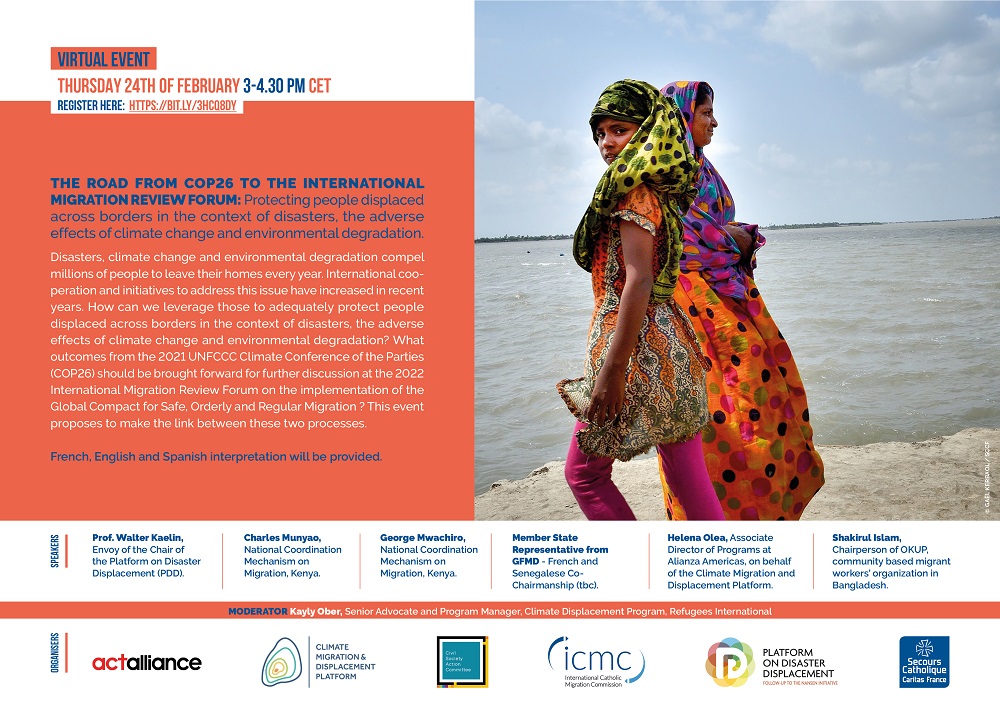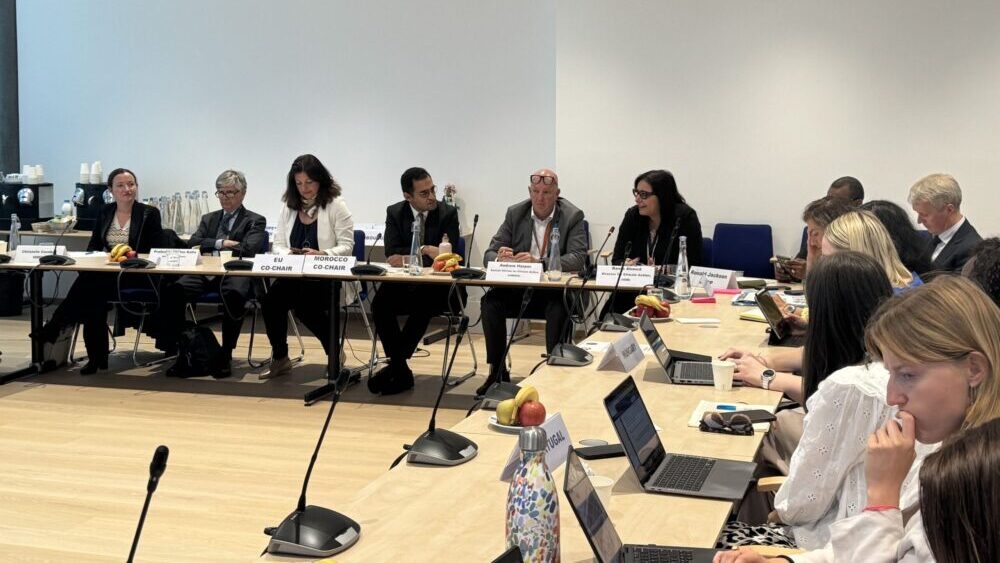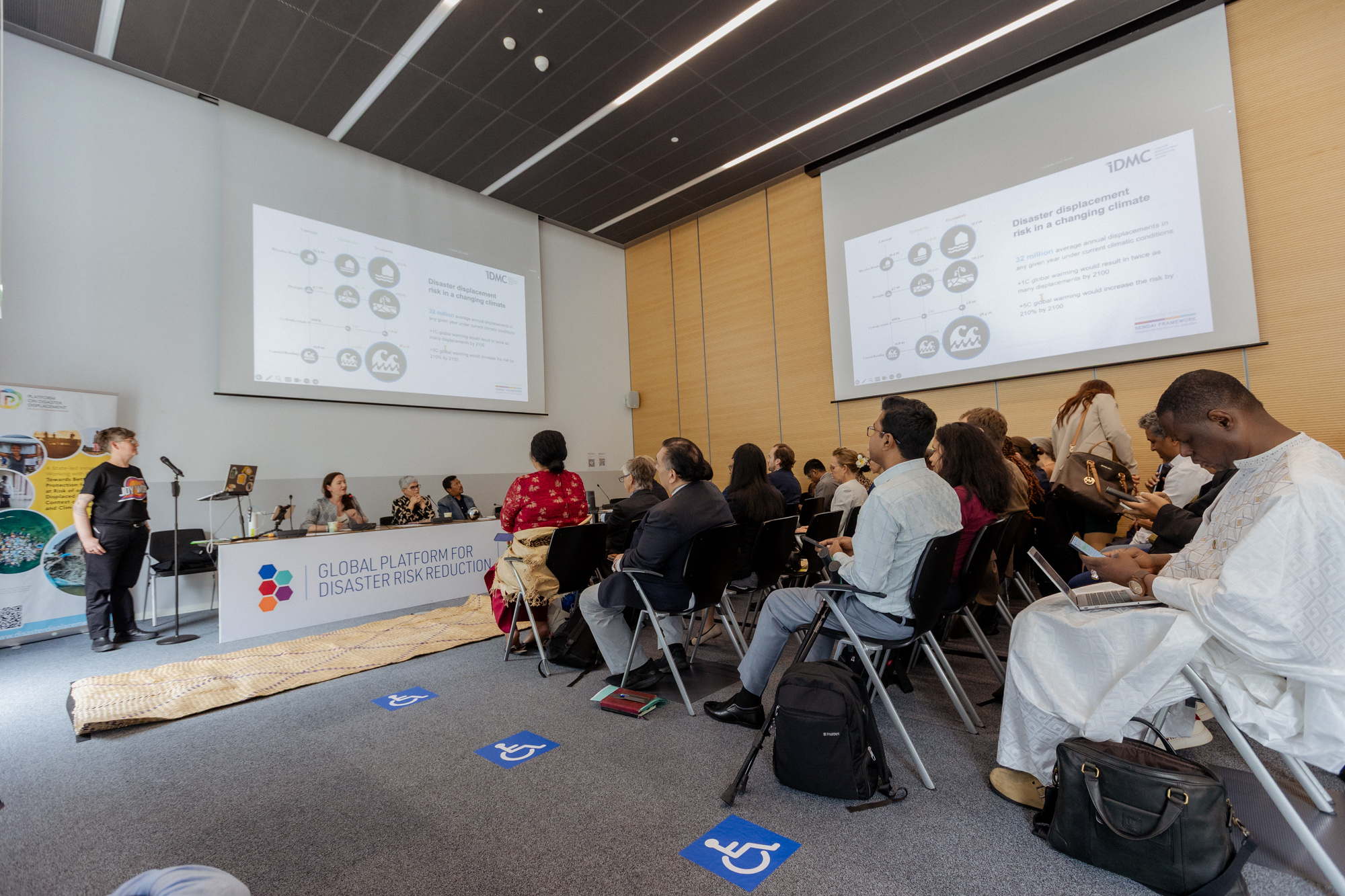Virtual Event | The Road from COP26 to the International Migration Review Forum

Virtual Event –
The Road from COP26 to the International Migration Review Forum: Protecting People Displaced Across Borders in the Context of Disasters, Adverse Effects of Climate Change and Environmental Degradation
24 February 2022
15:00 – 16:30 CET
Register Here https://bit.ly/3HCq8dy
Disasters, climate change and environmental degradation compel millions of people to leave their homes every year, whether within a country or across an international border. Recent years have seen increased international cooperation and institutional initiatives seeking to address issues related to human mobility in disaster and climate change contexts. How can we leverage the multiple existing initiatives to adequately protect persons displaced across borders in the context of disasters, the adverse effect of climate change and environmental degradation?
The Sustainable Development Goals (2015) put up an overall umbrella for action, but different initiatives, processes and fora address the issue more directly albeit with different scopes and perspectives. The Sendai Framework for Disaster Risk Reduction (2015) seeks to prevent new and reduce existing disaster risks, including displacement as a major human consequence and driver of disaster risk. The Nansen Initiative Protection Agenda (2015) developed a toolbox of policies to address the needs of people displaced across borders in the context of disasters, the effects of climate change and environmental degradation. To implement the recommendations of the Protection Agenda, the Platform on Disaster Displacement was created in 2016 to ensure the implementation and dissemination of this toolbox to prevent and prepare for displacement and to respond to situations when people are compelled to move across borders.
The 2015 Paris Agreement recognizes the importance of taking into account States’ human rights obligations and the rights of migrants in addressing climate change. The Paris Agreement also mandated the creation of the Task Force on Displacement under the UNFCCC Warsaw Mechanism for Loss & Damage (WIM) to further strengthen cooperation and provide support to developing countries to avert, minimize and address displacement related to the adverse impacts of climate change.
Lastly, since 2018, the Global Compacts for Migration (GCM) and on Refugees (GCR) have been new policy frameworks guiding efforts from the human mobility side. While the GCR acknowledges that climate change and disasters interact with other drivers of displacement, the GCM seeks in particular to promote a comprehensive and holistic approach to migration and other forms of human mobility, addressing drivers as well as and to finding solutions for all people compelled to move across borders in the context of disasters, the adverse effects of climate change and other environmental factors, and ensuring effective protection of their human rights. With the adoption of the GCM, the United Nations Network on Migration (UNNM) was created in order to ensure effective, timely and coordinated support to Member States for the implementation of the GCM. Climate change and migration is a priority of the Network within its new work plan for 2021 and 2022, with a dedicated workstream set up to guide the Network’s activities in this area.
This broad range of international actors and frameworks aims to support actions on the ground at local, national and/or regional levels, implemented by governments, international organizations, NGOs and other actors. This support can take different forms, such as investing in knowledge production to inform public policy, sharing of best practices, developing technical advice and guidelines, mobilising funding, and producing innovative political and legal proposals to address identified challenges. A key consideration in view of this plethora of stakeholders and initiatives at the intersection of different policy frameworks is how to leverage the various cross-cutting lessons learned to address human mobility challenges in disaster and climate change contexts in a comprehensive manner.
The webinar will propose to build a first bridge between the 2021 UNFCCC Conference of the Parties on climate (COP26) and the 2022 International Migration Review Forum (IMRF).
Current climate negotiations around the UNFCCC and the implementation of the Paris Agreement could bring progress with regards to addressing the needs of climate and disaster-affected communities. COP26 has highlighted an array of important measures to address this topic, particularly through scaling up action and support, including increased access to required financing, to implement the Task Force on Displacement Recommendations on integrated approaches to avert, minimize and address displacement related to the adverse effects of climate change. Support could also take shape in the form of catalyzing the technical assistance of relevant organizations, bodies, networks and experts for the implementation of relevant approaches at the local, national and regional level in developing countries that are particularly vulnerable to the adverse effects of climate change, for example under the Santiago Network for Loss and Damage.
The GCM offers concrete approaches to address various human mobility challenges in climate change and disaster contexts. To this end, Objective 2 recognizes the effects of climate change as adverse drivers of migration and outlines action areas to adapt and increase the resilience of affected communities, while Objective 5 of the GCM proposes concrete measures to ensure that people compelled to move in the context of climate change, disasters and environmental degradation have access to regular pathways for migration. But while solutions exist in the GCM, its non-binding nature and the limited political willingness of some States to concretely implement it prevent migrants to benefit from protection.
Looking ahead, the IMRF will be a global, intergovernmental platform to discuss and share progress on the implementation of all aspects of the GCM. The Forum itself will take place every four years, beginning in 2022, and will result in an intergovernmentally agreed Progress Declaration. The 2022 IMRF is scheduled for 10-12 May in New York, and will be an opportunity to have a first global snapshot of GCM implementation around the world. At the same time, it provides a platform for governments, practitioners, civil society and other stakeholders to further advance on the sticking points discussed at COP26 related to human mobility challenges in disaster and climate change contexts, and to be engaged in a long-term dialogue and accountability process.
Ultimately, the situation of people displaced across borders in the context of disasters, the adverse effects of climate change and environmental degradation calls for a horizontal coordination across silos at all levels, especially at national (and sub-national) and regional levels, in a whole-of-government as well as whole-of-society approach. International cooperation is crucial as well, providing the kinds of support mandated in the respective frameworks in a coherent way.
The main questions that the current webinar seeks to address are the following: how can we leverage this multiplicity of initiatives to adequately protect persons displaced across borders in the context of disasters, the adverse effect of climate change and environmental degradation? This implies looking for possible legal, normative and implementation gaps that may result in a lack of protection for people on the move. What bridges can be built between initiatives? How can we most effectively work across policy silos to develop coherent protection responses at different levels (international, regional, national, local)? More specifically, which specific outcomes or agenda items of COP26 should be put forward for further discussion during the IMRF?
The event is co-organized by: ActAlliance, CMDP, Civil Society Action Committee, ICMC, PDD, Secours Catholique-Caritas France. French, English and Spanish interpretation will be provided.
Useful Links

Background documents:
Advisory group on Climate Change and Human Mobility: Calling for Climate Action on Human Mobility. Key messages ahead of COP26
Platform on Disaster Displacement : Key Messages for COP26
UN Network on migration : Preparatory documents of the IMRF
The Civil Society Action Committee : Global Civil Society Priorities towards the 2022 IMRF




